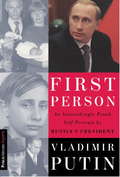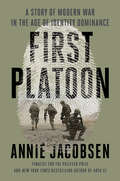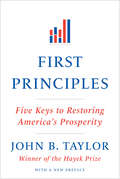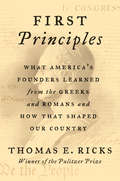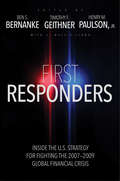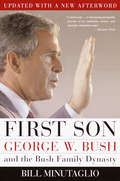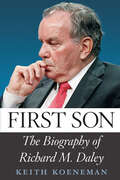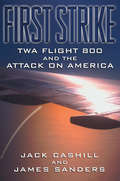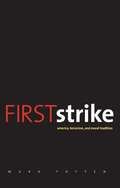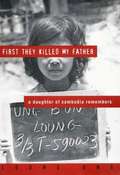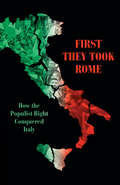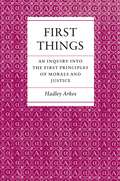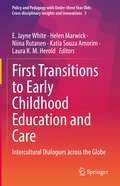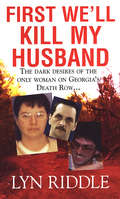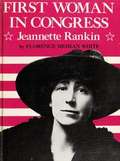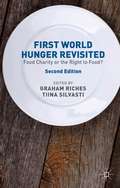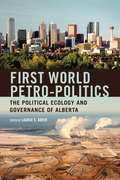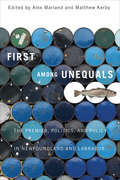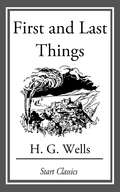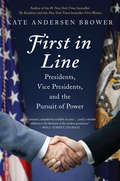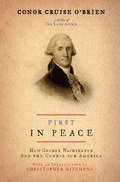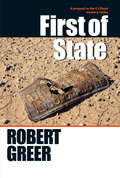- Table View
- List View
First Person: An Astonishingly Frank Self-Portrait by Russia's President Vladimir Putin
by Vladimir Putin Nataliya Gevorkyan Natalya Timakova Andrei KolesnikovWho is this Vladimir Putin? Who is this man who suddenly--overnight and without warning--was handed the reigns of power to one of the most complex, formidable, and volatile countries in the world? How can we trust him if we don't know him? First Person is an intimate, candid portrait of the man who holds the future of Russia in his grip. An extraordinary compilation of over 24 hours of in-depth interviews and remarkable photographs, it delves deep into Putin's KGB past and explores his meteoric rise to power. No Russian leader has ever subjected himself to this kind of public examination of his life and views. Both as a spy and as a virtual political unknown until selected by Boris Yeltsin to be Prime Minister, Putin has been regarded as man of mystery. Now, the curtain lifts to reveal a remarkable life of struggles and successes. Putin's life story is of major importance to the world.
First Platoon: A Story of Modern War in the Age of Identity Dominance
by Annie JacobsenAn urgent investigation into warfare, good, and evil in the age of biometrics, the technology that would allow the government to identify anyone, anywhere, at any time This is a story that starts off close and goes very big. The initial part of the story might sound familiar at first: It is about a platoon of mostly nineteen-year-old boys sent to Afghanistan, and an experience that ends abruptly in catastrophe. Their part of the story folds into the next: inexorably linked to those soldiers and never comprehensively reported before is the U.S. Department of Defense&’s quest to build the world&’s most powerful biometrics database, with the power to identify, monitor, catalogue, and police people all over the world. First Platoon is an American saga that illuminates a transformation of society made possible by this new technology. Part war story, part legal drama, it is about identity in the age of identification. About humanity—physical bravery, trauma, PTSD, a yearning to do right and good—in the age of biometrics, which reduce people to iris scans, fingerprint scans, voice patterning, detection by odor, gait, and more. And about the power of point-of-view in a burgeoning surveillance state. Based on hundreds of formerly classified documents, FOIA requests, and exclusive interviews, First Platoon is an investigative exposé by a master chronicler of government secrets. First Platoon reveals a post–9/11 Pentagon whose identification machines have grown more capable than the humans who must make sense of them. A Pentagon so powerful it can cover up its own internal mistakes in pursuit of endless wars. And a people at its mercy, in its last moments before a fundamental change so complete it might be impossible to take back.
First Principles: Five Keys to Restoring America's Prosperity
by John B. TaylorLeading economist John B. Taylor's straightforward plan to rebuild America's economic future by returning to its founding principles. Mired in a crippling economic slump and hamstrung by partisan political debates, America faces substantial economic challenges, from widespread unemployment to the government's ballooning debt. These assaults on our prosperity reflect the unintended consequences of more than a decade of government intervention in virtually all areas of the economy. Stanford University economist John B. Taylor proposes a natural and reasonable solution to our economic challenges: return to the country's founding principles--limited government, rule of law, strong incentives, reliance on markets, a predictable policy framework--and rekindle its economic dynamism.
First Principles: What America's Founders Learned from the Greeks and Romans and How That Shaped Our Country
by Thomas E. RicksThe Pulitzer Prize-winning journalist and #1 New York Times bestselling author offers a revelatory new book about the founding fathers, examining their educations and, in particular, their devotion to the ancient Greek and Roman classics—and how that influence would shape their ideals and the new American nation. <p><p> On the morning after the 2016 presidential election, Thomas Ricks awoke with a few questions on his mind: What kind of nation did we now have? Is it what was designed or intended by the nation’s founders? Trying to get as close to the source as he could, Ricks decided to go back and read the philosophy and literature that shaped the founders’ thinking, and the letters they wrote to each other debating these crucial works—among them the Iliad, Plutarch’s Lives, and the works of Xenophon, Epicurus, Aristotle, Cato, and Cicero. For though much attention has been paid the influence of English political philosophers, like John Locke, closer to their own era, the founders were far more immersed in the literature of the ancient world. <p> The first four American presidents came to their classical knowledge differently. Washington absorbed it mainly from the elite culture of his day; Adams from the laws and rhetoric of Rome; Jefferson immersed himself in classical philosophy, especially Epicureanism; and Madison, both a groundbreaking researcher and a deft politician, spent years studying the ancient world like a political scientist. Each of their experiences, and distinctive learning, played an essential role in the formation of the United States. In examining how and what they studied, looking at them in the unusual light of the classical world, Ricks is able to draw arresting and fresh portraits of men we thought we knew. <p> First Principles follows these four members of the Revolutionary generation from their youths to their adult lives, as they grappled with questions of independence, and forming and keeping a new nation. In doing so, Ricks interprets not only the effect of the ancient world on each man, and how that shaped our constitution and government, but offers startling new insights into these legendary leaders. <p> <b>A New York Times Bestseller</b>
First Responders: Inside the U.S. Strategy for Fighting the 2007-2009 Global Financial Crisis
by Henry M. Paulson Jr. Ben S. Bernanke Timothy F. Geithner J. Nellie LiangAn insider’s view of the U.S. government’s response to the 2007–2009 global financial crisis, as recounted by the people who made the key decisions In 2008, the world’s financial system stood on the brink of disaster. The United States faced an unprecedented crisis when the investment bank Lehman Brothers collapsed, setting off a global panic. Faced with the prospect of a new Great Depression, the Treasury Department, the Federal Reserve, the Federal Deposit Insurance Corporation, and other agencies took extraordinary measures to contain the damage and steady the financial system and the economy. Edited by three of the policymakers who led the government’s response to the crisis, with chapters written by the teams tasked with finding policy solutions, this book provides a comprehensive accounting of the internal debates and controversies surrounding the measures that were taken to stabilize the financial system and the economy. Offering previously untold insight into the key choices (including rejected options) and a frank evaluation of successes and failures, this volume is both an important historical document and an indispensable guide for confronting future financial calamities.
First Son: George W. Bush and the Bush Family Dynasty
by Bill MinutaglioMinutaglio, a Texas journalist who has worked for some of the state's major newspapers, tells the story of a powerful political family, beginning with the turn-of-the-century emergence of the influential Bush-Walker clan and of Prescott Bush, the Connecticut patrician who ingrained in his family an ethos that continues to exert influence on his son, former President George Bush, and his grandsons Jeb and George W. Bush. How these scions of the Bush dynasty struggle to live up to their legacy is the cen...
First Son: The Biography of Richard M. Daley
by Keith KoenemanMayor Richard M. Daley dropped the bomb at a routine news conference at City Hall on Tuesday. With no prelude or fanfare, Mr. Daley announced that he would not seek re-election when his term expires next year. 'Simply put, it's time, ' he said. a"New York Times, September 7, 2010"With those four words, an era ended. After twenty-two years, the longest-serving and most powerful mayor in the history of ChicagoOCoand, arguably, AmericaOCostepped down, leaving behind a city that was utterly transformed, and a complicated legacy we are only beginning to evaluate. Ina"First Son," Keith Koeneman chronicles the sometimes Shakespearean, sometimes Machiavellian life of an American political legend. Making deft use of unprecedented access to key players in the Daley administration, as well as Chicago's business and cultural leaders, Koeneman draws on more than one hundred interviews to tell an up-close, insider story of political triumph and personal evolution. With Koeneman as our guide, we follow young Daley from his beginnings as an average Bridgeport kid thought to lack his father's talent and charisma to his unlikely transformation into an iron-fisted leader. Daley not only escaped the giant shadow of his father but also transformed Chicago from a gritty, post-industrial Midwestern capital into a beautiful, sophisticated global city widely recognized as a model for innovative metropolises throughout the world. But in spite of his many accomplishments, Richard M. Daley's record is far from flawless. a"First Son"asets the dramatic improvement of certain parts of the city against the persistent realities of crime, financial stress, failing public housing, and dysfunctional schools. And it reveals that while in many ways Daley broke with the machine politics of his father, he continued to reward loyalty with favors, use the resources of city government to overwhelm opponents, and tolerate political corruption. A nuanced portrait of a complex man, a"First Son"ashows Daley to be sensitive yet tough, impatient yet persistent, a street-smart fighter and detail-driven policy expert who not only ran Chicago, buta"was"aChicago.
First Strike
by Jack Cashill James SandersSeptember 11, 2001, did not represent the first aerial assault against the American mainland. The first came on July 17,1996, with the downing of TWA Flight 800. This book looks in detail at what people saw and heard on this fateful night. First Strike explains how a determined corps of ordinary citizens worked to reveal the compromise and corruption that tainted the federal investigation. With an impressive array of facts, Jack Cashill and James Sanders show the relationship between events in July 1996 and September 2001 and proclaim how and why the American government has attempted to cover up the truth.
First Strike
by Jack CashillSeptember 11, 2001, did not represent the first aerial assault against the American mainland. The first came on July 17,1996, with the downing of TWA Flight 800. This book looks in detail at what people saw and heard on this fateful night. First Strike explains how a determined corps of ordinary citizens worked to reveal the compromise and corruption that tainted the federal investigation. With an impressive array of facts, Jack Cashill and James Sanders show the relationship between events in July 1996 and September 2001 and proclaim how and why the American government has attempted to cover up the truth.
First Strike: America, Terrorism, and Moral Tradition
by Mark TottenCan the use of force first against a less-than-imminent threat be both morally acceptable and consistent with American values? In this timely book Mark Totten offers the first in-depth, historical examination of the use of preemptive and preventive force through the lens of the just war tradition. Although critical of the American incursion into Iraq as a so-called "preemptive war," Totten argues that the new terrorist threat nonetheless demands careful consideration of when the first use of force is legitimate. The moral tradition, he concludes, provides a principled way forward that reconciles American values and the demands of security.
First Strike: Invasion! #1 (Star Trek: Vanguard #79)
by Shlomo NakdimonLong ago, before the days of myth and legend, our worlds belonged to them. Now they want them back…Captain Kirk is stunned when the Federation receives an urgent plea for help—from the Klingon Empire. A mysterious starship has invaded Klingon space and resisted all their efforts to destroy it. Establishing contact with the stranger’s ship, Kirk discovers that it is only the vanguard of a vast alien fleet obsessed with conquering the Klingons, the Federation, the Romulans, and all who dwell in the space that was once their own.The Invasion has begun…
First They Killed My Father: A Daughter of Cambodia Remembers
by Loung UngUntil the age of five, Lounge Ung lived in Phnom Penh, one of seven children of a high-ranking government official. She was a precocious child who loved the open city markets, fried crickets, chicken fights, and sassing her parents. While her beautiful mother worried that Loung was a troublemaker -- that she stomped around like a thirsty cow -- her beloved father knew Loung was a clever girl. When Pol Pot's Khmer Rouge army stormed into Phnom Penh in April 1975, Ung's family fled their home and moved from village to village to hide their identity, their education, their former life of privilege. Eventually, the family dispersed in order to survive. Because Loung was resilient and determined, she was trained as a child soldier in a work camp for orphans, while other siblings were sent to labor camps.
First They Took Rome: How the Populist Right Conquered Italy
by David BroderA provocative look at Italy's political disaster from the Cold War to today67% of Italian 18 to 34 year-olds still live with their parents. Over a third of them are unemployed. Economic growth has been close to nil for over two decades. The Eurozone's third-largest economy, Italy's long-term slide today threatens to blow up the whole European project. The rise to power in summer 2018 of Matteo Salvini's hard-right Lega and the eclectic Five Star Movement has pushed Italy, and the whole continent, into unknown territory. The monstrous forces that now rule Italy emerge from a deep well of despair. What broke apart in Italy over the 1990s and 2000s was not just a once mighty Left but also the very bases of social solidarity. The rise of Silvio Berlusconi, the asset-stripping of the Italian state and the creation of the neoliberal Democratic Party hollowed out Italian public life; and when the crisis hit, Italians were left to fend for themselves. But the change they voted for in 2018 threatens to push the country even deeper into the abyss.The upheavals in Rome epitomize a general crisis of democracy in the West. Examining Italy's history since the end of the Cold War, First We Take Rome looks at the wider significance of the current crisis and its wider political stakes. With clarity and breadth of scope, David Broder examines the recent history and social forces that brought the country to this crisis and the state of oppositional movements working to reestablish Italy's traditions of radicalism.
First Things: An Inquiry into the First Principles of Morals and Justice
by Hadley ArkesThis book restores to us an understanding that was once settled in the "moral sciences": that there are propositions, in morals and law, which are not only true but which cannot be otherwise. It was understood in the past that, in morals or in mathematics, our knowledge begins with certain axioms that must hold true of necessity; that the principles drawn from these axioms hold true universally, unaffected by variations in local "cultures"; and that the presence of these axioms makes it possible to have, in the domain of morals, some right answers. Hadley Arkes restates the grounds of that older understanding and unfolds its implications for the most vexing political problems of our day.The author turns first to the classic debate between Abraham Lincoln and Stephen Douglas. After establishing the groundwork and properties of moral propositions, he traces their application in such issues as selective conscientious objection, justifications for war, the war in Vietnam, a nation's obligation to intervene abroad, the notion of supererogatory acts, the claims of "privacy," and the problem of abortion.
First Transitions to Early Childhood Education and Care: Intercultural Dialogues across the Globe (Policy and Pedagogy with Under-three Year Olds: Cross-disciplinary Insights and Innovations #5)
by E. Jayne White Niina Rutanen Helen Marwick Katia Souza Amorim Laura K. M. HeroldThis book brings together the work of researchers from around the globe around the topic of children’s first transitions to early care and education. It discusses political and sociocultural contexts, theories, and ideologies around the theme. The book offers perspectives and findings on adult expectations around a child’s first transition, infant emotional experiences, the role of space, the part that key objects play in infant transitions, and the role of time. It also discusses age of first entry, routines and rhythms of the institutions, and the future expectations of those involved. The book takes a culturally responsive approach, revealing at times striking commonalities across countries, and at other points distinct differences in the people, environments, orienting pedagogies, and policies that inform an infant’s transition into care.
First We'll Kill My Husband
by Lyn RiddleA Murdered Husband. . . Gulf War veteran Doug Gissendaner would do anything for a friend, a stranger, or the wife who broke every rule in the marriage book. Now, investigators were scouring the Georgia woods not far from Doug's home. They'd already found the charred wreckage of his car. They knew they were looking for a body. . . A Hitman Who Killed For Love. . . Gregory Owen had been having an on-again, off-again affair with Doug's wife for years. Then Kelly Gissendaner told Greg it was time for her husband to die. With a knife and a plan, Greg forced Doug to drive into the woods. When Greg finished his savage, cold-blooded deed, Kelly showed up to make sure Doug was dead. A Woman On Death Row. . . This is the astounding true story of the only woman on Georgia's Death Row and the chilling, account of how she got there. From the hold Kelly had over a good and decent man to her dramatic, controversial trial, First We'll Kill My Husband captures the lies, schemes, and manipulations of a woman totally bent on murder. . . Includes 16 pages of shocking photos! Lyn Riddle is a freelance writer and journalist whose work regularly appears in The New York Times, the Los Angeles Times, and The Atlanta Constitution. She is the author of Family Blood: The Murder that Shattered an All-American Home and Ashes to Ashes. She lives in Simpsonville (near Greenville), SC.
First Woman In Congress: Jeannette Rankin
by Florence Meiman WhiteA biography of the first woman elected to Congress, who spent the 92 years of her life as a leader for woman suffrage, a lobbyist, and a social reformer.
First World Hunger Revisited
by Graham Riches Tiina SilvastiIs food aid the way of the future? What are the prospects for integrated public policies informed by the right to food? First World Hunger Revisited investigates the rise of food charity and corporately sponsored food banks as effective and sustainable responses to increasing hunger and food poverty in twelve rich 'food-secure' societies.
First World Petro-Politics: The Political Ecology and Governance of Alberta
by Laurie AdkinFirst World Petro-Politics examines the vital yet understudied case of a first world petro-state facing related social, ecological, and economic crises in the context of recent critical work on fossil capitalism.A wide-ranging and richly documented study of Alberta's political ecology - the relationship between the province's political and economic institutions and its natural environment - the volume tackles questions about the nature of the political regime, how it has governed, and where its primary fractures have emerged. Its authors examine Alberta's neo-liberal environmental regulation, institutional adaptation to petro-state imperatives, social movement organizing, Indigenous responses to extractive development, media framing of issues, and corporate strategies to secure social license to operate. Importantly, they also discuss policy alternatives for political democratization and for a transition to a low-carbon economy.The volume's conclusions offer a critical examination of petro-state theory, arguing for a comparative and contextual approach to understanding the relationships between dependence on carbon extraction and the nature of political regimes.
First among Unequals: The Premier, Politics, and Policy in Newfoundland and Labrador
by Alex Marland Matthew KerbyCanadians are told that provincial premiers wield considerable sway. Critics decry premiers as autocrats and dictators, while supporters label them as altruists and great leaders. In Newfoundland and Labrador the premier is expected to be the province's overlord, a patriotic defender of provincial interests, and the decision-maker who brokers competing policy priorities. But does a premier have as much power over government policy decisions as is popularly believed? First among Unequals, a detailed enquiry into the administration of Premier Danny Williams and the first year of his successor Kathy Dunderdale, suggests that the power of the premier is exaggerated by the media, critics, political parties, the public service, and the leaders themselves. With perspectives from economics, education, geography, health policy, history, and political science, contributors explore how dominant Williams was and test theories to show how power operates in provincial governments. They examine politics and government through case studies of the healthcare sectors, education, the fisheries, rural and regional development, hydroelectric projects, and the labour market. Focusing on an era of political populism and rapid economic growth, First among Unequals reasons that there is not enough evidence to suggest that the Premier's Office - even with someone like Danny Williams at the helm - independently shapes public policy. Contributors include Karlo Basta (Memorial), Sean Cadigan (Memorial), Angela Carter (Waterloo), Christopher Dunn (Memorial), Jim Feehan (Memorial), Gerald Galway (Memorial), Ryan Gibson (Memorial), James Kelly (Concordia), Royce Koop (Manitoba), Mario Levesque (Mount Allison), Maria Mathews (Memorial), John Peters (Laurentian), Michelle Porter (Memorial), Kate Puddister (McGill), Valérie Vézina (UQAM), and Kelly Vodden (Memorial, Grenfell).
First and Last Things
by H. G. WellsFirst and Last Things is a 1908 work of philosophy by H. G. Wells setting forth his beliefs in four "books" entitled "Metaphysics," "Of Belief," "Of General Conduct," and "Some Personal Things." Parts of the book were published in the Independent Magazine in July and August 1908. Wells revised the book extensively in 1917, in response to his religious conversion, but later published a further revision in 1929 that restored much of the book to its earlier form. Its main intellectual influences are Darwinism and certain German thinkers Wells had read, such as August Weismann. The pragmatism of William James, who had become a friend of Wells, was also an influence.
First in Line: Presidents, Vice Presidents, and the Pursuit of Power
by Kate Andersen BrowerFrom the author of the New York Times bestsellers First Women and The Residence, an intimate, news-making look at the men who are next in line to the most powerful office in the world—the vice presidents of the modern era—from Richard Nixon to Joe Biden to Mike Pence.Vice presidents occupy a unique and important position, living partway in the spotlight and part in the wings. Of the forty-eight vice presidents who have served the United States, fourteen have become president; eight of these have risen to the Oval Office because of a president’s death or assassination, and one became president after his boss’s resignation. John Nance Garner, FDR’s first vice president, famously said the vice presidency is "not worth a bucket of warm piss" (later cleaned up to "warm spit"). But things have changed dramatically in recent years. In interviews with more than two hundred people, including former vice presidents, their family members, and insiders and confidants of every president since Jimmy Carter, Kate Andersen Brower pulls back the curtain and reveals the sometimes cold, sometimes close, and always complicated relationship between our modern presidents and their vice presidents.Brower took us inside the lives of the White House staff and gave us an intimate look at the modern First Ladies; now, in her signature style, she introduces us to the second most powerful men in the world, exploring the lives and roles of thirteen modern vice presidents—eight Republicans and five Democrats. And she shares surprising revelations about the relationship between former Vice President Joe Biden and former President Barack Obama and how Vice President Mike Pence and President Donald Trump interact behind closed doors.From rivals to coworkers, there is a very tangible sense of admiration mixed with jealousy and resentment in nearly all these relationships between the number two and his boss, even the best ones, Brower reveals. Vice presidents owe their position to the president, a connection that affects not only how they are perceived but also their possible future as a presidential candidate—which is tied, for better or worse, to the president they serve. George H. W. Bush and Ronald Reagan had a famously prickly relationship during the 1980 primary, yet Bush would not have been elected president in 1988 without Reagan’s high approval rating. Al Gore’s 2000 loss, meanwhile, could be attributed to the Monica Lewinsky sex scandal and Bill Clinton’s impeachment. Current Vice President Mike Pence is walking a high-stakes political tightrope as he tries to reassure anxious Republicans while staying on his boss’s good side.This rich dynamic between the president and the vice president has never been fully explored or understood. Compelling and deeply reported, grounded in history and politics, and full of previously untold and incredibly personal stories, First In Line pierces the veil of secrecy enveloping this historic political office to offer us a candid portrait of what it’s truly like to be a heartbeat away.
First in Peace: How George Washington Set the Course for America
by O'Brien Conor CruiseJust before he died after a long and distinguished international career as a politician, commentator, and author, Conor Cruise O’Brien completed a study of George Washington’s presidency. Cruise O’Brien has been described as "a man who so persistently asks the right questions” (The Economist), and in this, his last book, he explores the question of how early America’s future was determined. First in Peace considers the dissension between Washington and Jefferson during the first U. S. presidency, and reveals Washington’s clear-sighted political wisdom while exposing Jefferson’s dangerous ideology. Cruise O’Brien makes the case that Washington, not Jefferson, was the true democrat, and commends his clarity of vision in restoring good relations with Britain, his preference for order and pragmatism, and his aversion to French political extremism.
First of State
by Robert GreerRobert Greer’s latest novel-a prequel to his CJ Floyd mystery series-takes readers back in time to a very young CJ Floyd. It’s 1972, and the 22-year-old decorated war vet has recently returned to Denver from Vietnam with post-traumatic stress disorder. Navigating depression, he finds a friend in World War II vet and amputee Wiley Ames, who shares his passion for rare and valuable western memorabilia. When Ames and a mysterious Chinese man are found murdered, CJ’s already fragile world threatens to collapse. His attempts to find his friend’s killer are thwarted at every turn, and finally he joins his Uncle Ike’s business as bail bondsman and bounty hunter. Five years later one of Ames’s treasured antique license plates turns up at a Denver flea market, and CJ is once again off and running. The trail to Wiley Ames’s murderer leads CJ down a dark path strewn with backstabbing antique dealers, conniving friends and relatives of Ames’s, and a shadowy musician. Equally a white-knuckle-ride murder mystery and a tale of a traumatized young man coming to terms with his past,First of Statefeatures the kind of fresh characters, street-smart dialogue, and ingenious plot twists that have made this series a critical and commercial success.
